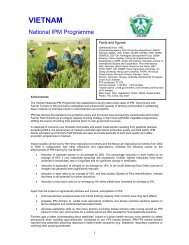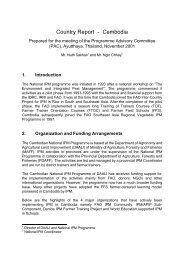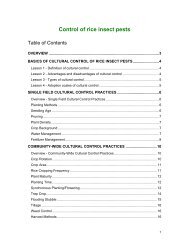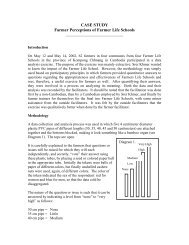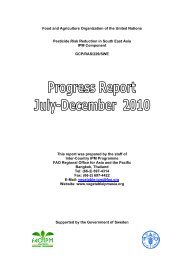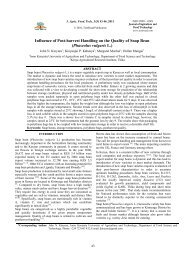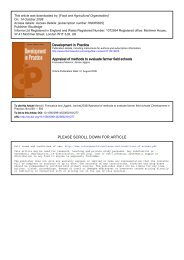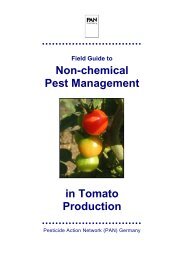Eggplant Integrated Pest Management AN ECOLOGICAL GUIDE
Eggplant Integrated Pest Management AN ECOLOGICAL GUIDE
Eggplant Integrated Pest Management AN ECOLOGICAL GUIDE
You also want an ePaper? Increase the reach of your titles
YUMPU automatically turns print PDFs into web optimized ePapers that Google loves.
__________________________________________________________________________________Major <strong>Eggplant</strong> Insect <strong>Pest</strong>s• The use of pesticides for the control of FSB is seldom sufficient to increase yield and reduce qualityloss. Since the FSB lives mostly inside stems or fruits, pesticides applied will never reach the larvaecompletely. Chemical control, even with systemic pesticides, is therefore difficult and seldomincreases profits. Insecticides for FSB control: why not?1. Larvae of FSB are difficult to reach with insecticides. Contact pesticides are not effective becausethe larvae live outside a plant for a few hours at most! After that they bore into shoots or fruits andusually live inside until pupation or may come out shortly to move to another shoot or fruit.2. Even use of systemic pesticides seldom provides sufficient control. Besides, systemic pesticidesmay be inside the fruit when you want to eat it….3. Adults of FSB usually live outside the field, they migrate to sheltered places. So insecticidesaimed to kill adults are a waste of money and time and may do more harm by killing beneficials inthe field. Several studies show that beneficials, e.g. the parasitoid Trathala flavo-orbitalis, canhelp control FSB.4. In 1993 trials in Bangladesh (BARI) showed that even insecticides of the group of syntheticpyrethroids did not give sufficient control of FSB. It was concluded that FSB can built upresistance against these pesticides.5. Yet, insecticides are widely and intensively used for the control of FSB. AVRDC’s baseline surveyin Jessore district of Bangladesh showed that farmers are often spraying their eggplant crops 140times/season or more for control of FSB. <strong>Pest</strong>icide cost was the single highest cost (32%) ofeggplant production (ref. www37).6. Irrational use of pesticides can result in serious problems to human health and the environment.• Bacillus thuringiensis (Bt) may be tested. See section on natural enemies above.• Where available and registered, the use of an insect-killing nematode solution like Steinernemariobravis might be worth trying.• The use of sex pheromone (a solution that attracts male adults) may help in the control of eggplantfruit and shoot borer. Since eggplant remains in the field for 6 months or longer, use of sexpheromone for mating disruption may help reduce insect infestation. Several institutes like theAVRDC, a large vegetable research institute in Taiwan, and CABI Bioscience are doing research todetermine the components and the best mixture of components for such a pheromone. See alsosection 4.11.2.Successful IPM strategies in Negros Occidental, the PhilippinesDuring a Farmers’ Field School in Negros Occidental (1998/1999), farmer participants concluded atthe end of the training that the combination of the following 4 cultural practices controlled 70% of FSBpopulation in eggplant:• Flooding the field (dry season) for irrigation (see points above),• Pruning of older leaves and use of wide spacing (1m x 1,5m),• Sanitation and proper disposal of FSB-infested plant material,• Fertilizer use as per recommended rate (on basis of soil testing).(pers.comm. Carlito Indencia, 2001).Another successful IPM StrategyIn an AVRDC study in Jessore, Bangladesh an IPM strategy consisting of weekly removal of FSBdamagedshoots, installation of pheromone traps to catch FSB males, and withholding of chemicalpesticides to allow natural enemies to control FSB, was developed and tested in farmers’ fields. Thisstrategy led to lower production costs and higher net incomes for farmers (ref. www37).☺☺☺☺☺☺☺☺☺☺75<strong>Eggplant</strong> Ecological Guide



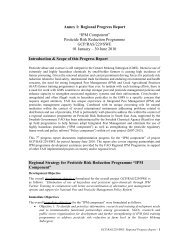
![Section 4 [ PDF file, 252 KB] - The Field Alliance](https://img.yumpu.com/51387260/1/158x260/section-4-pdf-file-252-kb-the-field-alliance.jpg?quality=85)
